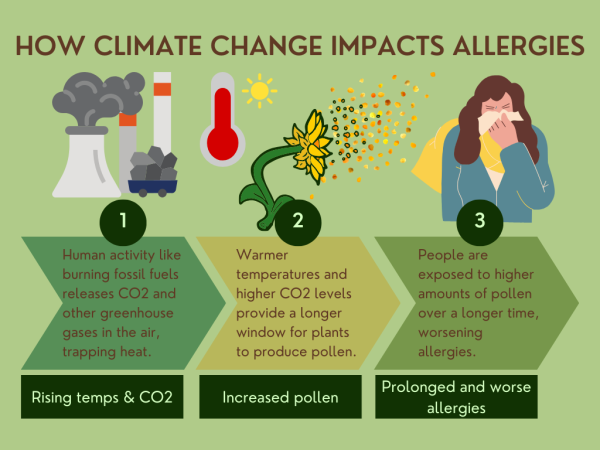As flowers burst into various colors and fill the air with sweet scents, so do sneezes, runny noses, and itchy eyes, signaling the dreaded allergy season that arrives with spring. Climate change prolongs the pollen-filled season, making many people experience longer and more severe seasonal allergies.
With rising levels of carbon dioxide in the atmosphere and increasing temperatures, plants bloom earlier and have extended blossoming periods, resulting in higher production and release of allergy-inducing pollen.
“We’re seeing earlier starts and an extension of the pollen season because warming temperatures delay the first frost of fall. As a result, the overall amounts of pollen are changing in response as well as the overall exposure time,” said Lewis Ziska, Ph.D., an associate professor at the Mailman School of Public Health at Columbia University.

A recent study by Ziska and fellow researchers analyzed long-term pollen data from 1990 to 2018. It revealed that pollen seasons lengthened by 20 days, with pollen concentrations increasing by about 21% across North America.
Similarly, another study conducted by doctors at the Stanford University School of Medicine, which used data from 2002 to 2019, found that the San Francisco Bay Area pollen season has extended by eight to nine weeks, linked to the local temperature increases.
According to Ziska, individuals sensitive to pollen are exposed to higher concentrations over an extended period, leading to more severe and prolonged allergy symptoms.
For people with allergies like Vincent Wong, a sophomore at Carlmont High School, this disrupts their work and studies.
“I’m sneezing all the time, and it’s not conducive to learning for me and other people. I get distracted by myself sneezing,” Wong said.
Preventive measures such as not leaving windows open, washing clothes more often, and having the proper medicine can help manage symptoms.
“The main ways of treatment are oral medicines called antihistamines, including nasal sprays that decrease inflammation in the nose, and immunotherapy like allergy shots. Medicines like Zyrtec, Allegra, and Claritin are very common and very popular,” said Dr. Debra Yeh, a pediatrician at Stanford Medicine Children’s Health Pediatrics.
However, people must recognize that as temperatures continue to rise, climate change doesn’t just impact the environment but also significantly affects our health.
“Climate change isn’t just about those big events, but it’s also more subtle in terms of the plants that we don’t think much about,” Ziska said. “Plant biology will be very affected by what’s happening and should be considered in the context of what climate change means in affecting human health.”













